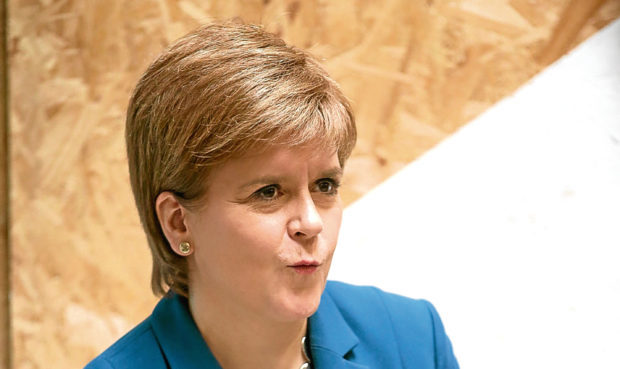Another referendum is beginning to look essential. No, not that one, and not that other one either, but a vote on protecting Scotland’s devolution powers.
The first referendum which sprung to mind would have been the second independence vote.
This was promised as a hard fact last year only to be dumped at the side of the road since.
Nicola Sturgeon does not want a second vote with no sign of growing support for the idea. She doesn’t want the other current referendum idea, a second vote on Brexit, either, for fear it splits the independence support.
The Scottish Government are chastised for back-pedalling on Indyref2, and for not coming out in the favour of Brexit 2.
It seems any referendum is unlikely.
However, these are strange times, as Scotland unites in resistance to an attack on Holyrood.
At issue is Theresa May’s vision of Britain. She wants to re-invent the UK to suit the Brexit vision. This means having a veto over the Scottish Parliament.
For Brexit to work, Britain must stop working as it does now. May wants the principle of devolution – Scots in control of Scottish problems, to paraphrase Donald Dewar – to be quashed. For her, Holyrood is a delivery agency, doing things Westminster is happy to delegate, but over which Downing Street and the Commons have a veto.
Most of Scotland’s political parties are outraged, a show of unity on constitutional matters not seen since 1997. For the Permanent Secretary Leslie Evans to brief that she told Whitehall officials they didn’t understand Scotland is also a pretty astonishing intervention.
Should May override the will of the Scottish people as expressed in the 1997 referendum and go ahead with rewriting devolution, she’s be picking a bit of a fight. In response Sturgeon could call Indyref2.
That would be a mistake. The nation shows no appetite for it, other parties in Scotland would oppose the idea and the SNP haven’t improved the independence offer since 2014.
Alternatively she could back a second Brexit referendum, but that is no defence of Scotland’s constitutional powers. Instead it is time for the SNP to consider the nationalist heresy of a Devo Max vote.
Devo Max is when Scotland controls everything but macro-economics, defence and foreign affairs. It means Scotland would be 100% reliant on its own economy to pay for its services.
A referendum calling for Devo Max, in the name of protecting Scotland’s democratic choices, would get cross-party support.
This is the position of Labour and the Liberal Democrats, and as it does not threaten the union should find some favour in Tory ranks.
It is either a shock remedy for a poorly performing economy, thus appealing to right-wing nats and Tories, or it is a fast track to getting enough policy levers to radically help the poor – and so appeals to the left.
What it is not is independence, and therefore has none of the complicated downside to do with currencies and borrowing regimes.
The ideal time to hold such a vote would be a one the same day as the next Scottish general election. The Scottish Government control the franchise and the polling stations in such elections, unlike Westminster votes.
It would give Scotland about a year post-UK Brexit to sort out a credible position for its Devo Max demand.
This wouldn’t change the fact that Scotland would be out of the EU, nor would it presage being out of the UK.
It would move Scotland to the option most popular among voters for over a decade, according to opinion polls.
Nobody gave May a mandate to change our parliament, so we do not need her approval to decide on our own future.
Devo Max has its risks. It would mean Scotland depending entirely on its own puny tax base to pay for services, which would almost certainly result in a tighter spending round than ever before.
It’s advantage is that it meets what the majority of Scottish voters have wanted for years, it protects the powers we do have, and takes us a step further to proper self-government, while allowing Scotland to adapt to post-Brexit Britain.
There are many stumbling blocks to this happening, but oddly the biggest is the SNP, who see anything short of independence as a sin.
Yet this mood of national unity, this convergence on a position, and the determination to speak up for Scotland, is a rare moment indeed. Demanding independence would split it apart.
Devolution is unfinished business and is now under attack.
As a nation, we should vote to secure our settled will.
